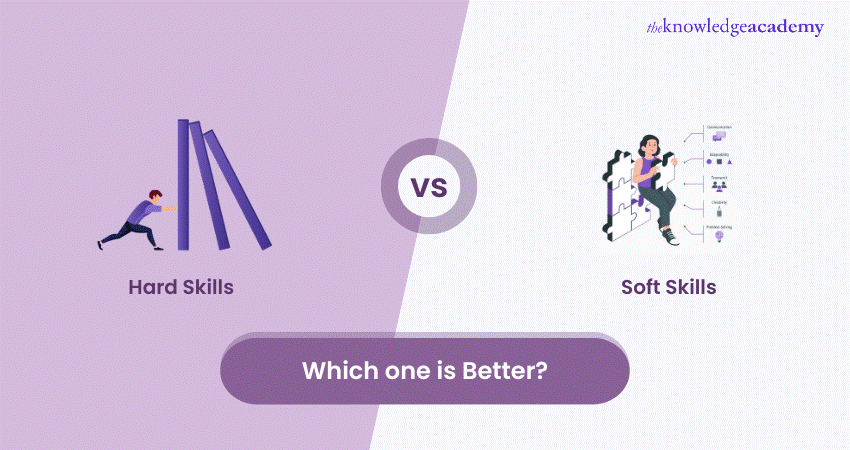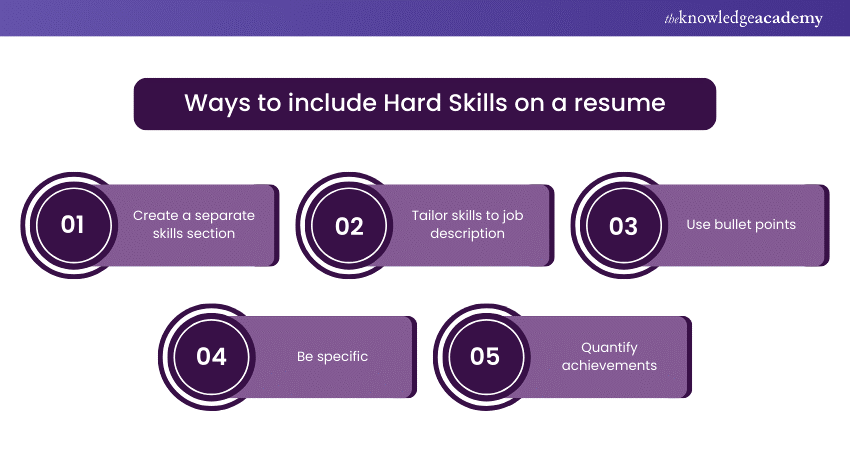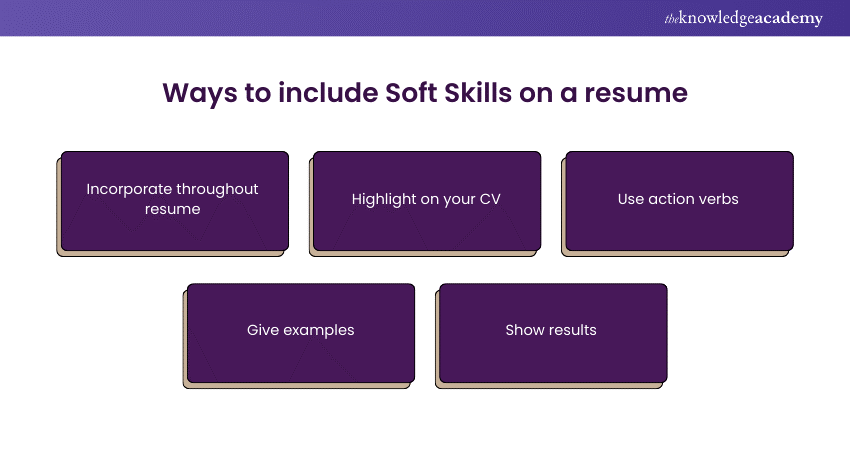We may not have the course you’re looking for. If you enquire or give us a call on +358 942454206 and speak to our training experts, we may still be able to help with your training requirements.
Training Outcomes Within Your Budget!
We ensure quality, budget-alignment, and timely delivery by our expert instructors.

In today's competitive job market, the debate over Hard Skills vs Soft Skills remains firm as one of the most common topics of argument between job seekers and recruiters —even including career experts. While Hard Skills are mostly perceived as technical skills and competencies obtained by an employee through education, training, and on-the-job experience, Soft Skills are essential for a person to work efficiently as a team member, leader, and communicator. However, when you take a closer look, both the types may seem important. So, how can you choose between the two? Read this blog to find which Hard Skills vs Soft Skills: Which one is better?
Table of Contents
1) What are Hard Skills?
2) What are Soft Skills?
3) What is the difference between Soft Skills and Hard Skills?
4) Ways to include Soft Skills and Hard Skills on a resume
5) Conclusion
What are Hard Skills?
When seeking professional development, Hard Skills are often regarded as the tangible, quantifiable abilities that individuals acquire through formal education, training programs, or practical experience. They are industry, role, and task-specific, teachable, and usually measurable. Very often, hard skills are related to some technical information or mastery of tools, technologies, or methodologies related to an area.
Instances of Hard Skills
The following are some instances in which Hard Skills can be used:
1)Technical proficiency in programming languages: Hard Skills are mainly technical abilities in programming languages, which are needed in software development, one of the examples being web design and data analysis, among other related positions. For example, a Software Engineer can be skilled in languages like Java, Python, JavaScript, or Ruby, which will enable him to develop very powerful and scalable software applications.
2) Graphic design software: This is one of the Hard Skills required if an individual is providing excellent expertise in fields like graphic design, advertising, or marketing. A Designer should display great ability in using Adobe Creative Cloud applications such as Photoshop, Illustrator, and InDesign to be able to develop a range of attractive designs of the visual media required for his work.
3) Data analysis tools: They use the Hard Skills needed in the data analysis tools to be able to bring out insights from huge datasets and present them for data-informed decision-making. Additionally, they should be proficient in software such as Microsoft Excel, SQL (Structured Query Language), R, or Python libraries like Pandas and NumPy for effective manipulation of needed data and statistics outlined from the data.
4) Language proficiency: The proficiency of any language is an invaluable Hard Skill, more so for fields of international business, tourism, or diplomacy. For example, a multilingual sales representative would be a well-accomplished person in languages such as Spanish, Mandarin, or Arabic to communicate with customers of whichever cultural background.
5) Certification and credential programs: Hard Skills are often validated through certifications and credentials obtained from reputable institutions or professional organisations. Examples include certifications in Project Management (e.g., Project Management Professional - PMP), IT credentials (e.g., Cisco Certified Network Associate - CCNA), or industry-specific licenses (e.g., Certified Public Accountant - CPA).
What are Soft Skills?
Soft Skills are also known as Interpersonal Skills or People Skills; they are the non-technical, intangible ability of a person to function within a team or organisation, manage other people. These skills can effectively enhance interaction or communication with others at work. While Hard Skills tend to focus on work and are quite easily transferable through some form of formal education or training, Soft Skills are often acquired through life experience, personal interaction, and self-awareness.
Instances of Soft Skills
The following are some instances in which Soft Skills can be used:
1) Communication skills: Communication involves the ability of both verbal and written skills at the core of soft skills. A person with Communication Skills is effective when he is in a position to express ideas and convince them by listening actively to others and putting forward the information briefly and convincingly.
2) Leadership abilities: Leadership skills involve the ability to inspire, motivate, and influence others to achieve common goals. Effective leaders demonstrate vision, integrity, and empathy, inspiring trust and confidence among team members and guiding them towards success.
3) Problem-solving skills: Problem-solving Skills entail the ability to identify, analyse, and resolve complex issues or challenges. Individuals with strong problem-solving skills exhibit creativity, critical thinking, and resourcefulness in finding innovative solutions to problems encountered in the workplace.
4) Adaptability and flexibility: Adaptability refers to the capacity to adjust to new situations, environments, or changes in circumstances. Flexible individuals demonstrate resilience and openness to change, readily adapting their approaches, priorities, and perspectives in response to evolving circumstances.
5) Time management and organisational skills: Time management and organisational skills involve the ability to prioritise tasks, manage deadlines, and effectively allocate resources. Individuals proficient in time management can optimise their productivity, minimise procrastination, and maintain a sense of balance between work and personal responsibilities.
Improve your time management skills through our Time Management Training!
What is the difference between Soft Skills and Hard Skills?
Soft Skills vs Hard Skills: which one is to choose? To find the answer to this question, refer to the following table:
|
Aspect |
Hard Skills |
Soft Skills |
|
Meaning |
Hard Skills are job-specific competencies and abilities that are necessary to complete work. They are the technical skills specific to the job, which a person has acquired through proper training and learning. |
Soft Skills are personal qualities and traits that impact how you work. They refer to the set of personality traits, which defines an individual’s relationships in a work environment, with others. |
|
Acquired through |
Formal education and training program |
Informal process, i.e., upbringing, and social surroundings |
|
Measurability |
Measurable |
Immeasurable |
|
Provability |
Easy to prove using evidence, such as certificate, degree, diploma, awards, etc. |
Associated with personal attributes, and so these are difficult to prove because they are intangible. |
|
Transferability |
Possible |
Depends on a person to person |
|
Impact on personality |
No |
Yes |
|
Examples |
Computer programming languages, proficiency in a foreign language, database management, data analytics, SEO/SEM marketing, sales or business analysis, financial management, UX design. |
Creativity, empathy, teamwork, problem-solving, critical thinking, adaptability and flexibility, organisation, integrity, effective communication, reliability and dependability, open-mindedness, punctuality, time management, attention to detail, strategic thinking, conflict resolution, work ethic. |
Improve your listening skills with our Active Listening Training - join today!
Ways to include Soft Skills and Hard Skills on a resume
If you are still unsure how are Soft Skills vs Hard Skills different, then you must learn how they are incorporated in a resume. This way you will get an idea of their importance. So, let’s get started:
Hard Skills
The following are the ways to include Hard Skills in your resume:

1) Create a separate skills section: Dedicate a section specifically for listing Hard Skills relevant to the job you're applying for.
2) Tailor skills to job description: Customise your list of Hard Skills to match the requirements outlined in the job description.
3) Use bullet points: Present Hard Skills in a bulleted format for easy readability and quick reference.
4) Be specific: Provide concrete examples or certifications to demonstrate proficiency in each hard skill.
5) Quantify achievements: Whenever possible, quantify your accomplishments related to each hard skill to showcase your impact.
Soft Skills
The following are the ways to include Soft Skills in your resume:

1) Incorporate throughout resume: Include the summary section, work experience, and key achievements of the resume.
2) Highlight on your CV: Emphasise Soft Skills by showing how you've used them in previous roles or projects.
3) Use action verbs: Use action words illustrating Soft Skills, for example, "collaborated," "communicated," "leadership," or "management," showing experiences like.
4) Give examples: Give brief examples of anecdotal evidence of how you have applied Soft Skills effectively in one or two specific situations.
5) Show results: Highlight the outcomes or impact of using Soft Skills, such as improved team collaboration or increased customer satisfaction.
Conclusion
Both Hard skills vs Soft Skills are required to be successful in the working environment. It is Hard Skills that qualify you for the job, but most of the time, it will be your Soft Skills that turn the table in regard to making you a valuable employee or a leader. Build technical competence and balance with interpersonal competencies, prepared for career excellence by creating success with the competitive requirements of the job market today.
Improve your communication skills with our Communication and Influencing skill Training.
Frequently Asked Questions

There are important hard and soft skills. The hard ones are more specific and can be taught, like technical skills. In the meantime, the soft ones are interpersonal skills, for example, communications and collaboration. Success often requires a balance of both types of skills, with their importance depending on the job context and environment.

Soft skills can enhance the effectiveness of Hard Skills but generally cannot replace them entirely. Both are valuable and necessary for success, with their importance depending on the specific job requirements and context.

The Knowledge Academy takes global learning to new heights, offering over 30,000 online courses across 490+ locations in 220 countries. This expansive reach ensures accessibility and convenience for learners worldwide.
Alongside our diverse Online Course Catalogue, encompassing 17 major categories, we go the extra mile by providing a plethora of free educational Online Resources like News updates, Blogs, videos, webinars, and interview questions. Tailoring learning experiences further, professionals can maximise value with customisable Course Bundles of TKA.

The Knowledge Academy’s Knowledge Pass, a prepaid voucher, adds another layer of flexibility, allowing course bookings over a 12-month period. Join us on a journey where education knows no bounds.

The Knowledge Academy offers various Personal Development Courses, including Time Management Training Course, Attention Management Training Course and Active Listening Skills Course. These courses cater to different skill levels, providing comprehensive insights into Benefits of Soft Skills.
Our Business Skills Blogs covers a range of topics offering valuable resources, best practices, and industry insights. Whether you are a beginner or looking to advance your Business Improvement skills, The Knowledge Academy's diverse courses and informative blogs have you covered.
Upcoming Business Skills Resources Batches & Dates
Date
 Time Management Training
Time Management Training
Fri 10th Jan 2025
Fri 14th Mar 2025
Fri 9th May 2025
Fri 11th Jul 2025
Fri 12th Sep 2025
Fri 14th Nov 2025







 Top Rated Course
Top Rated Course



 If you wish to make any changes to your course, please
If you wish to make any changes to your course, please


